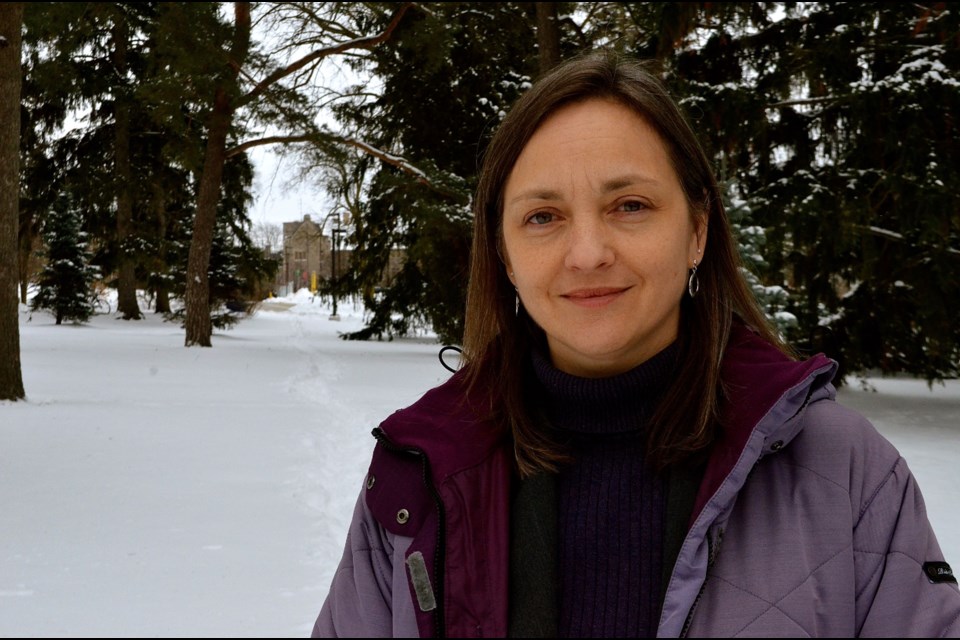The trees that were growing on the farm lands east of the University of Guelph have added 50 rings to their diameter and have seeded countless saplings since 1971. They and 165 hectares around them have escaped the bulldozer blades of urban sprawl because their growing value has been assessed on a different scale.
“There are different kinds of participants and different ways people interact with the Arboretum,” said director Justine Richardson. “It is designed. It’s not a wild place so, it is both a natural place and cultural place. That’s where those two things come together.”
Richardson will take over as Arboretum director on Feb. 3. She is replacing Prof. Shelley Hunt from the School of Environmental Studies who, over the past six years, has directed many research and educational programs and initiated a number of infrastructure upgrades and renovations at the Arboretum Centre and the Hilton Centre.
“Traditionally the Arboretum director has been a portion of a faculty member’s role,” said Richardson. “I am going to be a full time staff director. So, I am looking forward to exploring what that means with the staff and leadership. I will be working closely with the great staff, volunteers, the administration and the community members that are part of the Arboretum community to develop a plan.”
Richardson has been project manager for the International Institute for Critical Studies in Improvisation at the U of G since 2015 but she has maintained a lifelong connection to nature.
“I grew up on 68 acres of wooded hillside in Kentucky so I really value that time outside too,” she said. “I was born in the mountains of Kentucky right on the Virginia border. Whitesburg, Kentucky is a small town of 1,200 people in the Appalachian Mountains.”
She earned her BA at Yale and her MA at Michigan State.
“My masters degree is in interdisciplinary cultural studies and that is an approach where you look at the range of different ways to look at the same subject matter,” she said. “That is one of the things that excited me about the Arboretum because it means so many things to so many people and in different ways.”
She and husband Brady Deaton are parents to two high school students Liam and Anna Sophia. They moved to Guelph in 2004 and became Canadian citizens in 2015.
Richardson has arrived at the Arboretum during a significant point in its history.
“In doing my research for the position I learned that there was talk of establishing an arboretum in the 1930s but it was founded in 1971,” said Richardson. “So, 2020 is the 50th year of the Arboretum. It is a great opportunity to take stock and hear some of the stories from people who had their pictures taken there or got married there or have taken their children for walks there.”
The Arboretum is the largest of its kind in Ontario and contains more than 40,000 specimens in more than 30 plant collections and conservation gene banks. It is visited by more than 100,000 people every year, 6,000 of whom travel from around the world to take part in workshops and special events.
“I see the Arboretum like a living museum,” said Richardson. “Every plant is an experiment and also part of the collection. The education programs are international models. It is a place-based hub for research, teaching and community engagement where people feel really connected to the space and to campus.”
She sees value, not only in studying the trees and natural systems but the relationship between the Arboretum and the human, urban community.
“The more we are learning about mental health and being in nature and with the kind of research and education that goes on it has a role to play in so many of the current issues of our time,” she said. “It is a beautiful part of this city and an incredible vision to have this preserved and open and available to people who walk their dogs there, run there or ski there, play frisbee or hold events there.”
She has plans to document the relationships people have developed with the Arboretum.
“I have a background in media as a video maker and the stories of people’s connections to the Arboretum are something important,” she said. “I want to hear those stories and celebrate them and help make a plan for the next 50 years.”
Richardson found inspiration in one of the many gardens for her philosophy going forward.
“In terms of what I will be doing, there is that brilliant Zen quote outside the Japanese garden that says, ‘Before enlightenment, chopping wood, carrying water. After enlightenment, chopping wood, carrying water.’
So, I am really excited to be part of the work and be part of this next phase of the Arboretum.”



